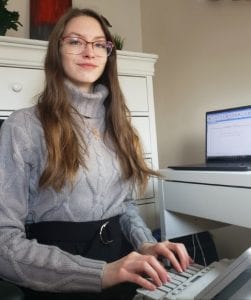
My Journey Through the Captioning and Court Reporting Program – Part 1
Becoming a court reporter is a challenge. Of all the people that start the program, only a small percentage will finish and work in the industry. That, factored with a high number of older court reporters retiring, is why we are starting to see a shortage.
However, with some recent pushes by the National Court Reporters Association and local associations across the country, there is a campaign in place to bring the opportunities that this job offers to the forefront.
 As part of IR’s commitment to our industry we have connected with a new student, Mikayla Lentz, who is attending at the Northern Alberta Institute of Technology – NAIT – and we will follow her journey over the next couple of years. Each month we will speak with her on various levels she is going through and learn more about what it takes to get through this program through the eyes of a student.
As part of IR’s commitment to our industry we have connected with a new student, Mikayla Lentz, who is attending at the Northern Alberta Institute of Technology – NAIT – and we will follow her journey over the next couple of years. Each month we will speak with her on various levels she is going through and learn more about what it takes to get through this program through the eyes of a student.
Let’s get our conversation with Mikayla started!
Q: What first interested you in the Captioning and Court Reporting (CACR) program at the Northern Alberta Institute of Technology – NAIT?
Mikayla: I heard about the program through my grandmother, and it was due to her that I first got intrigued. It seemed like a job that would be interesting, yet not quite a hobby. I always tried to aim for a job that was enjoyable; however, I felt somewhat hesitant to consider jobs that I enjoyed a lot. Essentially, I wanted a job that I couldn’t drain the life out of, so to speak. The last thing I wanted was to turn something fun into a chore, so I definitely wanted something that was new, unfamiliar, and yet still interesting.
After hearing about the program, I decided it would be a good fit and definitely worth a try. I would get to learn a new, fairly hands-on skill and probably hear some interesting cases on the job, both of which are quite appealing to me.
Q: What made you decide to enter the captioning and court reporting program at NAIT?
Mikayla: As I read further into the profession, I decided to pursue it. The main factors that came into play were the pay and the security of the field. The pay, from what I have read, seems to be sufficient enough to provide a fair opportunity for growth in my future. As for the security aspect, I have heard quite frequently that there is a shortage of court reporters. Assuming you make it through the schooling, the job availability is definitely a strong benefit, in my opinion. With regard to the school, I found that the tuition costs at NAIT are relatively fair compared to other schools I have heard about.
Q: Were there any advance preparation classes that you participated in, and would you recommend these to anyone interested in the program?
Mikayla: Yes, yes, and yes! I attended NAIT’s Discover Steno workshop, which is a six-week course provided by the university. It is also a requirement for competitive entry into the actual CACR program, and it is completely free of charge.
During the class, you get the chance to become acquainted with the stenotype machine. You will learn the keyboard layout, the manner of writing used, some punctuation, and eventually finish off with basic sentences. All of this material is covered in the first two weeks of the CACR program, so this workshop is definitely an extremely useful asset.
I would recommend taking this course if the program is of interest to you. Not only does it give you a chance to get a head start on the program, but it is a great opportunity to help you figure out if you would enjoy it before committing to a full semester. And of course, you don’t have to pay a penny. Honestly, it couldn’t get any better than that.
Q: Tell us about your first few weeks in the course and what that was like.
Mikayla: I expected the CACR program to be difficult compared to high school, of course, but it still caught me off guard.
As mentioned, the first few weeks of classes are centred around the concepts learned in Discover Steno. The difference is, however, you learn a new concept every day, rather than every week. At first, it seemed quite fast-paced, and admittedly it did feel a bit overwhelming. Eventually, though, I got used to the flow of the course, especially with assistance from the instructors. Despite the brisk pace, the course has a pretty good environment, which I would credit to the instructors. They are friendly, supportive, informative, and they are some of the best teachers I have ever had.
I would recommend keeping your steno writer from the workshop over the summer break. Even if you only practice occasionally during summer, I am sure it would make a difference in maintaining your familiarity with writing!
Q: Did those first weeks change your perception of the course and how you thought it would be?
Mikayla: I knew it would be a difficult course, but getting used to the quick pace, new software, and the new learning environment was a bit stressful at times. I realized I would have to focus on my studies more than anticipated, too. You need to have a good level of organization, motivation, and a fair bit of work-life balance. Minimizing stress was important for me because whenever I was stressed, I had a tendency to doubt myself or get frustrated with my shorthand progression. Also, I suppose this goes along with being organized, time management skills are very important.
Socially, it was more comfortable than I expected, honestly. I’m not entirely sure what I expected, but it was nice.
Q: What were the initial challenges you faced with the program and how did you overcome these?
Mikayla: It certainly forced me to figure out my study habits. Deciding how to balance leisure, work, and shorthand practice was hard to get used to, at first. The instructors recommended about two hours of typing practice per day, ideally uninterrupted. This was difficult for someone like myself, who usually never studied more than ten minutes before a test in high school.
I had to cut back on the amount of shifts I worked and make a more solid routine for myself. The structure helped, especially when I found the times of day that allowed me to focus best. I set aside that time for practice, but I also made sure to give myself enough time for leisure as well. Practice is good, but I certainly didn’t want to burn myself out.
If you have good study habits and experience with higher workloads, you’re already off to a good start!
Q: You’re taking this course online due to the current COVID protocols. What benefits or challenges you are facing with the remote atmosphere of the course?
Mikayla: Well, being able to sleep in is a nice perk!
On a more serious note, really, the extra time is a huge benefit. No more waking up at 6:00, no more freezing bus stops or unpredictable winter driving. I can finish my class and immediately begin practicing, rather than having to drive home for 30 minutes or bus for longer. I’m sure many of my classmates would agree with me on this, too.
Although I know a lot of people deeply despise online school these days, I feel this course is able to be delivered very easily and clearly in an online format. I haven’t had any issues with it so far. The material is explained well, and the teachers are always available to provide assistance.
In terms of socializing, it is definitely lacking a bit, but we make do with what we have! A few of the students get together weekly after class to hang out, grab a few snacks and chat for an hour or so. The lack of in-person interaction does give a surprising benefit to class, however. Being able to text questions, rather than verbally asking them, is an interesting plus side to online learning. It’s less disruptive, almost, as you don’t have to wait for a break in the teacher’s monologue to get your question in. You can ask more questions without disturbing the class, and you don’t have to worry about missing the answers when the lessons are recorded.
It has been rather odd to adjust to, but not too terrible overall!
Join us again next month where we discuss how Mikayla has progressed.
Want to learn more about becoming a court reporter? If you are in Alberta, NAIT offers one of the best programs in North America. You can learn more with NAIT and introduce yourself with the Discover Steno program.
To sign up for the March/April introduction, click here.
Or sign up for the May/June introduction by clicking here.
If you are in other parts of Canada or the United States, look further at the National Court Reporters Association website for other options.

